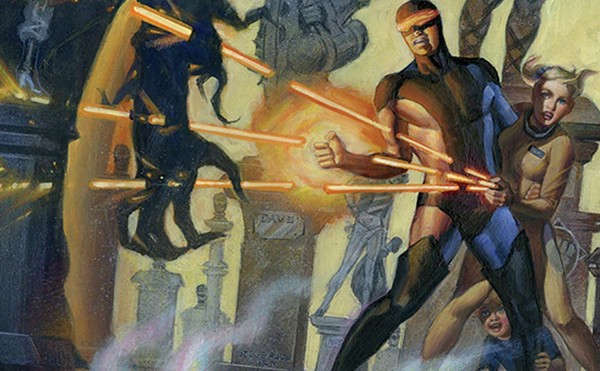| |
Sandra Cisneros took 10 years to complete her highly anticipated second novel, Caramelo, and it shows: in her daring literary experimentation, the Bible-weight size of the book, the considerable amount of research it must have required, and in the minor but many flaws Caramelo contains.
Many families have a naturally gifted storyteller like Cisneros, the one person they can count on to remember and recount our history with an acceptable blend of fact and fiction. "Tell me a story, even if it's a lie," reads her epigraph. That readers can accept, because it keeps them connected and entertained. But they can also count on the storyteller to be annoyingly long-winded, to carry them through endless tangents, to enthrall them in flowery words and vivid descriptions until they forget what the point was.
This is Cisneros' most serious sin in attempting to construct a semi-autobiographical epic that spans three countries and four generations of family tales. Along the way, readers are introduced to characters who are admirable, laughable, memorable, and deplorable - and are privy to the ancient family chisme that connects them all. Each chapter is as sweet and satisfying as a piece of caramelo candy, but equally small in size. While a collection of vignettes with a loosely connecting theme may have worked well in The House on Mango Street, the same technique risks losing its readers before they reach Caramelo's 400th page. By that time, Cisneros has introduced so many themes and characters and left them hanging, one can't help but compare the tale to the unfinished caramelo rebozo (shawl) that becomes the novel's central symbol.
The rebozo first falls into the hands of our narrator Celaya, a precocious child, in the book's first part, "Recuerdo de Acapulco," where readers are introduced to the entire family during a drama-filled trip to visit The Awful Grandmother and The Little Grandfather in Mexico's capitol. In the second part, "When I Was Dirt," we learn of the rebozo's origins in a family of shawl makers as well as The Awful Grandmother's past, which is also full of sensation and scandal. At this point, the grandmother's ghost, or perhaps Celaya's alter ego, carries on a dialogue with the narrator, butting in to criticize and correct her mistakes and begging for a little discretion in her own history. (Unfortunately, this engaging technique is dropped as abruptly as it appeared.)
The telenovela continues in "The Eagle and the Serpent," the book's final section, which attempts to tie up some - but not all - loose ends, and details Celaya's adolescence in San Antonio. Local readers who have never seen Mexico or walked the streets of Chicago can simply judge Cisneros' description of our city and easily trust in her ability to capture and recreate a strong sense of place. Of the famous basilica in densely populated Mexico City, she writes, "The old cathedral collapsing under its own weight, the air ruined, filthy, corncobs rotting in the curb, the neighborhood pocked, overpopulated, and boiling in its own stew of juices, corner men hissing psst, psst at me, flies resting on the custard gelatins rubbing their furry forelegs together like I-can't-wait."
| Caramelo By Sandra Cisneros Vintage Books $13.95 (paperback), 464 pages ISBN: 0679742581 |
Multicultural or multilingual novels often guarantee difficulties in translations, and Caramelo is no exception. Cisneros spices her story with a healthy dose of Spanish, and though most words are either translated or simple enough to retain comprehension, her choice of what to translate seems arbitrary. For instance, a random word like "pharmacy" becomes la farmacia, while the character Aunty Light-Skin is never referred to simply as Tia Guerra. And the expression Ay caray! was left alone, yet the Grandmother's awkward, trademark saying, "What a barbarity!" seemed normal to the book's editors.
Caramelo has its share of imperfections, but that's what happens when we allow a natural storyteller to run wild for so long. She will dig for family dirt as far back as she can go, include any and every memory recalled or fantasized, conjure up ancestral spirits and throw them into the stew as well. Eventually she may forget her original purpose in telling the story, but it doesn't mean her audience won't savor every bit of it. •

















